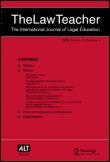
Training and Education in Professional Psychology
Scope & Guideline
Advancing Training in Professional Psychology
Introduction
Aims and Scopes
- Diversity and Inclusion in Training:
The journal prioritizes research that addresses diversity, equity, and inclusion within psychology training programs. This includes examining the training needs of underrepresented groups and developing curricula that promote cultural competency. - Innovative Training Methodologies:
A core focus is on exploring and implementing innovative training methodologies, such as telepsychology, simulated patient encounters, and deliberate practice strategies to enhance clinical skills and competencies among trainees. - Ethical and Social Responsibility:
The journal emphasizes the ethical responsibilities of psychologists and the need for training programs to incorporate social justice principles, addressing systemic issues such as racism and other forms of discrimination in mental health care. - Competency Development:
Research on developing and assessing competencies in various domains of psychology practice is a central theme. This includes the creation of new assessment tools and frameworks that guide the training and evaluation of psychology trainees. - Impact of Technology in Training:
The journal explores the role of technology in training practices, including the use of online platforms for supervision and therapy, and how these tools can enhance learning and clinical practice.
Trending and Emerging
- Antiracist and Social Justice Training:
An increasing number of articles focus on integrating antiracist practices and social justice principles into psychology training, reflecting a broader societal movement towards equity and inclusion. - Cultural Competency and Humility:
There is a strong emphasis on cultural humility and competency as essential components of training programs. This includes developing curricula that prepare trainees to work effectively with diverse populations. - Telehealth and Remote Training Innovations:
The COVID-19 pandemic has accelerated the adoption of telehealth practices in training. Research is trending towards understanding and optimizing remote supervision and training methodologies. - Mental Health and Well-Being of Trainees:
There is a growing focus on the mental health and well-being of psychology trainees, with studies examining self-care practices and the impact of stressors on their training experiences. - Community-Engaged Training Models:
Emerging themes highlight the importance of community engagement in training models. Collaborative partnerships between training programs and community organizations are increasingly explored to enhance practical training and service delivery.
Declining or Waning
- Traditional Training Models:
There is a noticeable decline in research focused on traditional, didactic training models that do not incorporate active learning or competency-based approaches. As the field evolves, there is less emphasis on these outdated methods. - General Psychological Assessment:
Themes related to general psychological assessment practices are becoming less frequent, as the focus shifts towards culturally responsive assessment and specific competency development in diverse populations. - Narrow Focus on Specific Disorders:
Research concentrating solely on training for specific psychological disorders, without consideration for broader systemic issues such as social justice and diversity, is waning. The journal is moving towards a more holistic view of training that incorporates multiple aspects of care. - Standardized Testing and Assessment Practices:
The discussions surrounding the efficacy and necessity of standardized testing methods in psychology training have diminished, as the field leans towards more nuanced and individualized assessment strategies. - Non-Collaborative Training Approaches:
There appears to be a decline in articles advocating for non-collaborative training approaches. The trend is shifting towards collaborative models that integrate community and interdisciplinary perspectives into training.
Similar Journals

Revista Publicaciones
Bridging research and practice for a brighter educational future.Revista Publicaciones, published by EDITORIAL UNIV GRANADA, stands as a vital resource for researchers, educators, and students engaged in the fields of educational and developmental psychology. Since its inception in 2001, this Open Access journal has aimed to disseminate high-quality, peer-reviewed research to foster a deeper understanding of psychological principles and educational practices. Hailing from Granada, Spain, the journal emphasizes its commitment to accessibility and scholarly excellence, as evidenced by its presence in Scopus with respectable rankings in both Developmental and Educational Psychology and Education. With its Q4 category ranking in 2023, the journal is dedicated to bridging research gaps and encouraging innovation in a rapidly evolving discipline. Through a convergence of insights and methodologies published yearly, Revista Publicaciones continues to be an essential outlet for advancing educational psychology research and practice.

Law Teacher
Fostering Excellence in Legal Scholarship and EducationLaw Teacher is a premier academic journal dedicated to the field of legal education, published by Routledge Journals, Taylor & Francis Ltd. With an ISSN of 0306-9400 and an E-ISSN of 1943-0353, the journal has been a leading platform since its inception in 1967, exploring innovative approaches and pedagogical strategies in law teaching. Recognized for its impact, it currently holds a Q3 ranking in Law and Q4 in Education as of 2023, reflecting its significance within these fields. The journal not only serves as a repository for cutting-edge research but also engages educators, researchers, and practitioners, fostering dialogue and collaboration among stakeholders in legal education. Operating from the United Kingdom, Law Teacher is committed to enhancing the quality of legal training and scholarship, ensuring its relevance to contemporary issues in law and legal practice.

Virtualidad Educacion y Ciencia
Bridging Technology and Pedagogy for a New Era of LearningVirtualidad Educacion y Ciencia is a leading open-access journal published by Univ Nacl Cordoba, Centro Estudios Avanzados, dedicated to advancing the field of educational virtuality and science. With its ISSN 1853-6530, this interdisciplinary journal has been pivotal in fostering dialogue among researchers, educators, and practitioners since its inception in 2010. The journal emphasizes the integration of technology in education, aiming to explore innovative pedagogical practices and the implications of virtual learning environments. Situated in Córdoba, Argentina, it contributes to a rich landscape of global scholarship, offering researchers and professionals an avenue to disseminate their findings widely without financial barriers. The journal's commitment to high editorial standards ensures that published articles are of high impact and relevance, making it an essential resource for anyone interested in the intersection of technology and education.

Education and Training
Fostering lifelong learning through impactful research.Education and Training is a leading peer-reviewed journal published by Emerald Group Publishing Ltd, dedicated to advancing the fields of education and professional development. With an impressive impact factor and recognized as a Q1 journal in both Business, Management, and Education, it serves as a crucial resource for researchers, educators, and practitioners. The journal's rich history, dating back to 1959, reflects its enduring commitment to delivering high-quality, research-driven insights that inform educational practices and management strategies. The Scopus rankings further affirm its significance in the academic community, showcasing its competitive position within the social sciences. Notably, the journal does not currently offer open access options, ensuring a curated audience of scholarly individuals who value rigorous academic contributions. By providing a platform for innovative research and thought leadership, Education and Training continues to shape the discourse on effective educational methodologies and enhance lifelong learning across various contexts.

PSYCHOLOGIE IN ERZIEHUNG UND UNTERRICHT
Exploring the intersection of psychology and pedagogy.PSYCHOLOGIE IN ERZIEHUNG UND UNTERRICHT, published by ERNST REINHARDT GMBH CO VERLAG, serves as a pivotal platform for research in the fields of Developmental and Educational Psychology. Since its inception, this esteemed journal has focused on disseminating groundbreaking insights and innovative practices from 1996 to the present, with expectations to continue through 2024. Despite its current ranking of Q4 in category quartiles and a Scopus rank of #309 out of 360, the journal remains a crucial resource for scholars, educators, and practitioners seeking to enhance their understanding of psychological principles within educational contexts. Situated in the vibrant academic landscape of Germany, the journal emphasizes both theoretical and practical perspectives, motivating interdisciplinary discussions that are vital in addressing contemporary challenges in education and human development. As the journal continues to evolve, it invites contributions that explore emerging trends, providing a rich source of information for both researchers and professionals dedicated to improving educational outcomes through psychological insights.

AEM Education and Training
Exploring new horizons in healthcare education and practice.AEM Education and Training is a leading peer-reviewed journal published by WILEY, focusing on the intersection of education, emergency medicine, and nursing, with a commitment to advancing knowledge and practice in these critical fields. Launched in 2017, this journal has quickly established itself as a key resource, as evidenced by its impressive Q2 ranking in both Education and Emergency Medicine, and a top-tier Q1 ranking in Emergency Nursing as of 2023. The journal aims to disseminate high-quality research that enriches educational practices and improves clinical outcomes, serving as a vital platform for healthcare educators and practitioners. With the growing importance of effective training in emergency settings, AEM Education and Training plays an essential role in shaping future leaders in health education and patient care. Researchers, professionals, and students will find an array of insightful articles that address contemporary challenges and innovations in their fields. Although currently not an open-access journal, its findings contribute significantly to the broader discourse in educational practices and emergency care.

Cognitive Behaviour Therapist
Advancing the Science of Cognitive Behavioral Therapy.Cognitive Behaviour Therapist is a premier journal dedicated to advancing the field of psychology, particularly in the realms of clinical and cognitive behavioral therapies. Published by Cambridge University Press, this esteemed journal has carved out a notable presence in the academic landscape, evidenced by its impact factors placing it in the Q2 category in both Clinical and Experimental Psychology as of 2023. With a focus on bridging theoretical insights and practical applications, the journal serves as an essential platform for researchers, clinicians, and students alike, offering a rich repository of innovative studies and methodologies from 2008 to 2024. The UK-based journal stands out with a robust Scopus ranking—positioned 46th out of 165 in Experimental and Cognitive Psychology and 92nd out of 311 in Clinical Psychology, reflecting its critical role in shaping contemporary psychological discourse. While the journal does not currently offer open access options, its rigorous peer-reviewed content remains vital for those aspiring to deepen their understanding and application of cognitive-behavioral approaches in therapeutic settings.

Art Therapy
Exploring the Healing Power of CreativityArt Therapy is a leading academic journal published by ROUTLEDGE JOURNALS, TAYLOR & FRANCIS LTD, dedicated to exploring the intersections of art and therapy since its inception in 1983. As a crucial resource in the fields of Clinical Psychology and Complementary and Manual Therapy, it is positioned in the Q3 quartile for Clinical Psychology and Q2 quartile for Complementary and Manual Therapy based on the 2023 category rankings. With its ISSN 0742-1656 and E-ISSN 2159-9394, the journal continues to be an important platform for researchers, professionals, and students seeking to enhance their understanding of therapeutic practices through artistic expression. Although it is not an Open Access journal, its accessibility through institutional subscriptions ensures a wide dissemination of innovative research and findings. The journal's commitment to advancing knowledge in art therapy makes it a vital addition to any scholarly collection, fostering ongoing dialogue and development in this dynamic field.

International Journal of Ethics Education
Transforming Education Through Ethical DialogueIntroducing the International Journal of Ethics Education, a cutting-edge publication dedicated to the exploration and advancement of ethical practices in educational contexts. Published by SpringerNature, this journal serves as a pivotal platform for researchers, educators, and policymakers focusing on the critical intersection of ethics and education. With its commitment to academic rigor, the International Journal of Ethics Education provides peer-reviewed articles that foster dialogue and promote ethical frameworks that can be integrated within curricula globally. Although currently not an open-access journal, it grants access to vital research tailored for those passionate about cultivating integrity and moral reasoning in educational systems. The journal seeks to enhance understanding and implementation of ethical principles, making it an essential resource for professionals and students aiming to contribute positively to their fields.

Bordon-Revista de Pedagogia
Fostering scholarly dialogue in the realm of pedagogy.Bordon-Revista de Pedagogia is an esteemed peer-reviewed journal published by the SOC ESPANOLA PEDAGOGIA in Spain, dedicated to advancing the fields of education and developmental psychology. With an ISSN of 0210-5934 and an E-ISSN of 2340-6577, this journal features research that spans a wide spectrum of pedagogical theories, practices, and innovations. As indicated by its Q3 classification in both the Developmental and Educational Psychology and Education categories for 2023, it serves as a vital resource for academics and practitioners alike. The journal occupies an essential position in the Scopus rankings, demonstrating its growing influence in the social sciences, particularly in education, where it ranks #783 out of 1543. Researchers and professionals will benefit from the journal's commitment to publishing high-quality research and insights that foster pedagogical advancement. Operating without an open access model, Bordon provides a beneficial platform for scholarly discourse until 2024, encouraging collaborations and sharing of innovative educational practices.